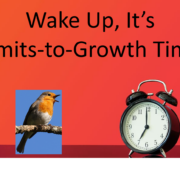A New View of Work
by Christian Williams
Many of us have been raised according to the “Protestant work ethic.” That is to say, we were encouraged to work hard and thus become a successful and productive member of society. But what if this advice is wrong? As the economy reaches and breaches the limits to growth, working long hours causes market failures, giving weight to the idea that governments should intervene to reduce average working hours.
In the “empty world” of the past, hard work was a public good with few negative externalities on society. In today’s “full world,” work has become a common-pool resource, vulnerable to over-exploitation. In the absence of social or cultural norms to take care of this common-pool resource, governmental intervention is the best option for preventing market failure and encouraging an optimal amount of work. Unfortunately, our work ethic is worsening the situation.

Doesn’t a shorter work week seem like a good idea?
Technological development over the past few centuries has allowed for a combination of reduced hours of work and increased consumption. Indeed, these are the only options for dealing with higher labor productivity (and labor productivity has consistently risen) while still maintaining high employment rates. But as the economy hits the limits to growth, the option to maintain employment through further increases in consumption becomes unavailable, meaning that work sharing becomes necessary. But OECD statistics reveal that over the past three decades there has been very little reduction in the amount of time people spend at work. Instead, consumption has risen drastically while unemployment has remained unacceptably high. If governments in high-consuming nations shift their focus from economic growth to wider sustainability objectives, they will quickly see that there are many benefits of a shorter work week.[1]
Here are some of those benefits:
- Energy consumption would decrease, especially energy spent on getting to and from work;
- Resource consumption would decrease as people trade some of their wages for more time;
- With extra time, people could make more sustainable lifestyle choices (e.g., bike, walk, exercise, eat well, garden etc);
- People would have more time for family and friends, less stress and better health;
- Fewer people would be unemployed, and they could make an easier transition to retirement;
- There would be more time for democratic participation, education, and exploration of other avenues to personal and community enrichment;
- A better-rested workforce is likely to be more productive;
- Both employers and employees could take advantage of more flexible employment circumstances.
Despite these and other potential benefits, we need a stronger case to justify government intervention. And that case begins with the recognition that “free” labor markets are far from free. Employees, even if they are aware of the benefits of working less, are often unable to reduce their working hours. Previous work time reductions have not originated through individual choice, but through strong union influence or state legislation, such as the Ten Hours Act (1847) in the UK or the Fair Labor Standards Act (1938) in the U.S. Juliet Schor and other scholars have suggested that a rising imbalance of power between employers and employees over recent decades has led people to work longer hours than they would otherwise choose. Most workers simply can’t ask their boss for a four-day week.[2] Other analysts have suggested that the power of marketing has led people to spend above their means and then work more to pay their debts. Furthermore, in times of economic crisis, people feel anxious about losing their jobs. Such anxiety can drive them to work harder to protect themselves, resulting in a work intensification that contributes to the tragic “jobless recovery.”
If people will not or cannot choose to work less, what are the implications? Society suffers from three market failures:
- We have an overworked workforce, resulting in social costs from broken families to higher healthcare costs.
- We have a large, disenfranchised group of people who can no longer find work, a breach of their human right to work (Article 23 of the Universal Declaration of Human Rights).
- Long hours contribute to greater production and, in turn, consumption, with a larger ecological burden being placed on future generations and other species.
These failures are the result of a rush to secure a share of a depleting common-pool resource. But as the amount of work becomes increasingly scarce, it is natural that people try to maintain and enhance their share — a “tragedy of the commons” scenario as described by Garrett Hardin. We can’t deal with this tragedy using outdated, empty-world tactics. In the empty world, we responded to technological improvements by increasing consumption. Moving forward, we must either learn to work less and be content with an excess of leisure, or reject the technological innovations that replace human labor — that is, reject the focus on efficiency and labor productivity.
To ensure that we do not contribute to the impending tragedy, we must all aim to work less. This also requires a social overhaul of the work ethic, and a new respect for idleness and leisure. Keynes, writing some eighty years ago, saw that adjusting to a life of leisure was the primary challenge for coming generations (us), as opposed to meeting basic needs as had been the challenge for all of human history. “To those who sweat for their daily bread, leisure is a longed-for sweet — until they get it”.[3] Personally, a shorter work week sounds fine to me.
[1] See for example, the report from the New Economics Foundation in the UK titled 21 Hours.
[2] For an interesting discussion on individual labor supply curves and hypotheses, see David George (2000): “Driven to Spend: Longer Work Hours as a Byproduct of Market Forces” in Working Time: International Trends, Theory and Policy Perspectives, (eds.) Lonnie Golden and Deborah Figart, Routledge, London. George refers to Schor’s book The Overworked American (1991) among others.
[3] Keynes, John M., 1963, “Economic Possibilities for our Grandchildren” in Essays in Persuasion, (first published 1930), W. W. Norton & Co., New York.
—
Christian Williams recently completed a Master’s in Sustainable Development at Uppsala University (Sweden). His thesis focused on the shorter work week as part of a transition towards a steady state economy, including a case study and political analysis from New Zealand. If you would like an electronic copy of his thesis (with a more comprehensive version of the above argument), please contact him by email.








This is a very welcome analysis by Christian Williams and I hope people pay close attention to it. I hope that it also will open dialogue about several of the points that Christian raises. I want to address three of the issues briefly here and refer readers to a longer paper and book manuscript that discuss these matters in more detail.
First, I am delighted that Christian refers to work as a “common-pool resource.” I put forward the proposition of work as a common-pool resource, following Elinor Ostrom’s analysis, two years ago in the manuscript, “Jobs Liberty and the Bottom Line.” I would argue that work not only has become a common-pool resource but has always had such characteristics and that movements in the past for shorter hours have tacitly addressed work as a commons. I elaborate on this theme in a paper, abstracted from my manuscript, “Time on the Ledger: Social Accounting for the Good Society.”
Arising out of viewing work as a common-pool resource is my disagreement with Christian’s prescription for government intervention to limit the hours of work. I’m not opposed to some government incentives to facilitate work time reduction but I want to suggest that the impetus for regulation and enforcement needs to come from the grass roots. In her case study analysis of common-pool resource management, Ostrom found that well-managed locally-based organizations of the resource users were more effective in managing such resources than remote, technocratic agencies. The reason for this is that the resource users (in this case it would be workers) had more at stake in making sure that rules were enforced and resource protected. I have discussed institutional arrangements in my manuscript and in the article mentioned above.
My third point may be mainly a matter of syntax but it highlights an important issue. Christian writes, “working long hours causes market failure” and that in the past hard work had “few negative externalities.” My disagreement is that, technically speaking, it is an inherent market failure that leads to excessive hours of work, not the other way around. Sydney J. Chapman formalized the theory of the hours of labor in 1909 and his conclusions pointed to the tendency in a competitive market for both employers and employees to “prefer” hours that were too long from the standpoint of output (employers) and worker welfare (employees). This perverse preference is driven by competitive pressures. As this inherent tendency has always been a feature of wage work, its “negative externalities” have also always been pervasive (although the term “externality” is a bit of a misnomer as the negative effect does not just fall on some third party).
I am currently investigating the history of economic thought regarding market failure and externalities and would welcome dialogue with others who are interested in the topic.
Many decades ago I was introduced to the concept of BOD – Biochemcal Oxygen Demand – and could easily sense the logic behind equating a certain load of organic waste from industry to waste from a certain number of people.
The idea came to me shortly therafter to analogously equate the work possible by a gallon of oil driving some machinery, to that of a certain number of people doing manual work. I could sense that in the US alone billions of invisible equivalent-workers were let loose by technically channelled work done by fossil energies in oil and gas instead of bioenergy derived from food and applied by the hands of Man.
It was then the very idea of there being something desirable by full employment simply vaporized! A rather silent revolution had taken place in reality, while outdated economic theories of employment remained static and stupid.
Instead of facing the issue head-on, nations – for example Norway – long ago started to shorten work hours, lengthen vacations, favor earlier retirements, allow pregnant women a year off with full pay etc. etc.
In the US obscene efforts are under way to make machines handle store-registers and reduce human services. It’s nearly impossible to make a phone call without getting engaged in a stupid conversation with a computer. Strong efforts are made to REDUCE (!) employment while unemployment is high and growing. At the same time some people who excel in sports are paid millions to have fun. Some of them even refer to what they do as work! [Unnecessary ‘work’ of a kind that increasingly and unavoidably occupies more and more people.]
In principle, ideally, human workers in our fossil fuel driven machine times should pay to work! And pay more, if they wanted the better, more interesting ‘jobs.’ It should cost more to work on a space ship or do brain surgery than sweep the streets. In practice, the nation would have to forcefully enlist sufficient people to do the kind of work no one wants to pay to do.
Christian Williams is right on, but the way forward will stupidly be met with much resistance rooted in ignorance and fear of change. Billions of invisible equivalent-workers are fully employed in the US alone and major adjustments to that fact should have been initiated and made explicit decades ago. The current employment situation is perverse. The Earth is being chocked by all the work done by fossil energies while conventional economists are upset by high unemployment!
Christian Williams’ article was much appreciated.
R. Overby.
Mr. Williams this is great research and thinking. I am so pleased to learn of it. Changing work habits and philosophies is a critical component to getting to sustainability. I am so irritated that “mainstream” economists miss this entirely. So-called behavioral economics is the wrong paradigm of knowledge. It won’t add any discovery in this area, in my opinion. The kind of knowledge that you are addressing here is along what Jurgen Habermas calls emancipatory knowledge. It is the knowledge of self science, not instrumental control.
I posted a short review of your article on my blog: http://consciouseconomics.org/good-news-help-the-environment-by-working-les
For some reason, my comment from yesterday appears to be hung up in moderation. I’ve posted the comment, along with a link back to this article at my blog:
http://ecologicalheadstand.blogspot.com/2011/09/new-view-of-work.html
Many years ago I began learning to do more with less and I must say my life and my health have improved dramatically.
In a capitalist society goods and services cost as much as a consumer is willing to pay. If one does not have/take the time to live an efficient lifestyle costs spiral out of control and more money is needed to maintain that inefficient lifestyle. Same can be said for democracy, if one doesn’t take to time necessary to get involved, democracy tends to spiral out of control.
Thank you Mr Williams for saying what needs to be said.
Meanwhile, MIT and Harvard economists insist on reciting the discredited mantra about a “lump-of-labor fallacy.” The latest example is a National Science Foundation white paper by David Autor and Lawrence Katz claiming:
I have amassed voluminous evidence of the fraudulent nature of this fallacy claim. See my open letter to Paul Krugman of May 7, 2011: http://ecologicalheadstand.blogspot.com/2011/05/open-letter-to-paul-krugman.html
Please write to professors Autor [[email protected]] and Katz [[email protected]] demanding that they either retract their demonstrably false claims about the alleged fallacy or rebut the evidence presented in my letter to Paul Krugman. This is an instance where shaming the perpetrators of a lie could have some good effect.
Sandwichman, this article might be of some interest to you.
http://homes.chass.utoronto.ca/~jheath/BEwithout.pdf
Best,
SGA
Thank you, Simon. Interesting article.